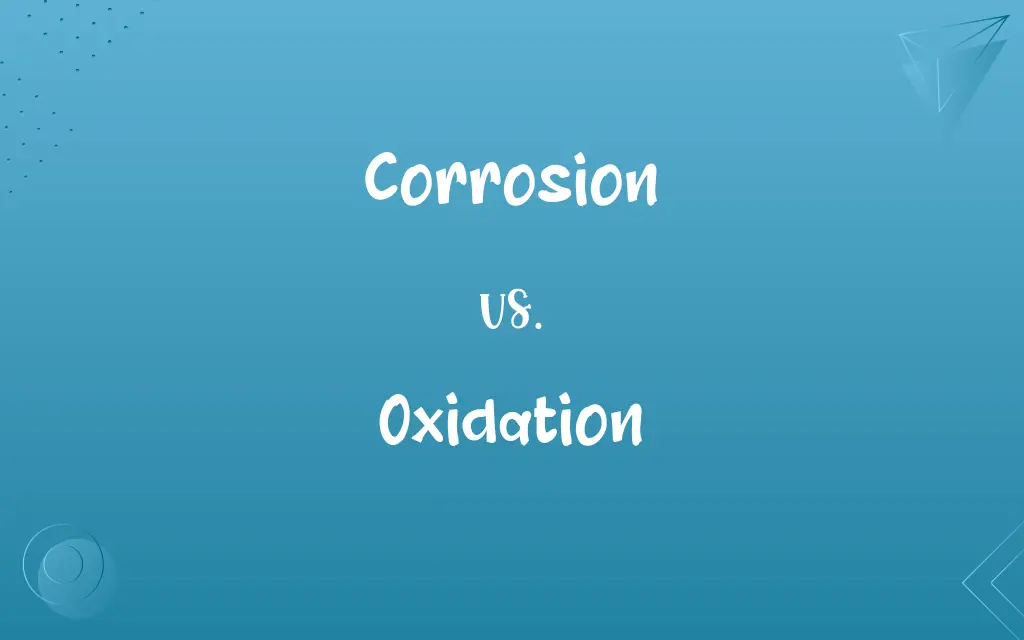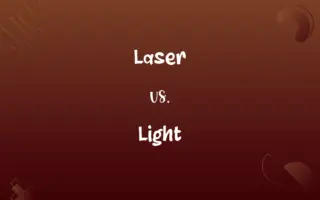Corrosion vs. Oxidation: Know the Difference

By Shumaila Saeed || Updated on December 25, 2023
Corrosion is the degradation of materials, often metals, due to chemical reactions, typically with the environment. Oxidation is a chemical reaction involving the loss of electrons, often resulting in the formation of oxides.

Key Differences
Corrosion generally refers to the deterioration of metals due to chemical reactions with their environment, often involving oxygen. Oxidation is a broader term, describing a chemical reaction in which a substance loses electrons, which can occur in both metals and non-metals.
Shumaila Saeed
Nov 16, 2023
In corrosion, the material, usually metal, reacts with its environment, leading to structural weakness and damage. This often involves oxidation, but also includes other reactions. Oxidation, on the other hand, is a fundamental chemical process that can happen in a variety of contexts, not limited to the deterioration of materials.
Shumaila Saeed
Nov 16, 2023
Corrosion often results in visible changes like rust on iron or tarnish on silver, indicating a material's degradation. This is frequently a result of oxidation, where the metal loses electrons and forms oxides. However, oxidation can occur without any visible signs, and in a wide range of chemical contexts beyond just metal degradation.
Shumaila Saeed
Nov 16, 2023
Corrosion is a specific type of oxidation that affects materials, mainly metals. It's a practical concern in industries and construction due to material degradation. Oxidation is a key concept in chemistry, central to understanding various chemical reactions, including but not limited to corrosion.
Shumaila Saeed
Nov 16, 2023
Corrosion typically requires a medium (like water or air) for the chemical reactions to occur. Oxidation, in contrast, is a component of many chemical reactions and can happen in various environments, not necessarily requiring a specific medium like in the case of corrosion.
Shumaila Saeed
Nov 16, 2023
ADVERTISEMENT
Comparison Chart
Definition
Chemical degradation of materials, especially metals.
Chemical process where a substance loses electrons.
Shumaila Saeed
Nov 16, 2023
Occurrence
Primarily in metals exposed to environments like air or water.
In various substances, not limited to metals or specific conditions.
Shumaila Saeed
Nov 16, 2023
Visible Effects
Often leads to visible damage like rust or tarnish.
Can be invisible, like in internal chemical reactions.
Shumaila Saeed
Nov 16, 2023
Chemical Requirement
Requires a medium (air, water) for the reaction.
Can occur in a variety of environments.
Shumaila Saeed
Nov 16, 2023
Practical Impact
Major concern in industries for material longevity.
Fundamental in understanding various chemical reactions.
Shumaila Saeed
Nov 16, 2023
ADVERTISEMENT
Corrosion and Oxidation Definitions
Corrosion
Gradual destruction of materials (mostly metals) through chemical reactions.
The iron gate showed signs of corrosion, with patches of rust spreading across its surface.
Shumaila Saeed
Nov 16, 2023
Oxidation
Process where atoms or molecules lose electrons, often forming oxides.
Oxidation of copper over time gives it a distinctive green patina.
Shumaila Saeed
Nov 16, 2023
Corrosion
Degradation of metals caused by electrochemical processes.
Corrosion weakened the bridge's structure, necessitating urgent repairs.
Shumaila Saeed
Nov 16, 2023
Oxidation
Chemical transformation involving the loss of electrons, key in combustion.
The oxidation of propane in a grill facilitates cooking by releasing heat.
Shumaila Saeed
Nov 16, 2023
Corrosion
Material decay, particularly in metals, due to redox reactions with elements like oxygen.
The car's undercarriage showed corrosion, a common issue in older vehicles.
Shumaila Saeed
Nov 16, 2023
ADVERTISEMENT
Oxidation
Chemical reaction in which a substance loses electrons.
Oxidation of glucose during cellular respiration releases energy for the body.
Shumaila Saeed
Nov 16, 2023
Corrosion
Chemical erosion of materials, especially metals, due to environmental factors.
The pipeline suffered corrosion due to prolonged exposure to acidic rain.
Shumaila Saeed
Nov 16, 2023
Oxidation
Formation of oxides as a result of a substance reacting with oxygen.
The oxidation of iron results in rust, degrading the metal's integrity.
Shumaila Saeed
Nov 16, 2023
Oxidation
A reaction in which the atoms of an element lose electrons and the valence of the element is correspondingly increased.
Shumaila Saeed
Oct 19, 2023
Oxidation
(chemistry) A reaction in which the atoms of an element lose electrons and the oxidation state of the element increases.
Shumaila Saeed
Oct 19, 2023
Oxidation
The act or process of oxidizing, or the state or result of being oxidized.
Shumaila Saeed
Oct 19, 2023
Oxidation
The process of oxidizing; the addition of oxygen to a compound with a loss of electrons; always occurs accompanied by reduction
Shumaila Saeed
Oct 19, 2023
Corrosion
(by extension) The gradual destruction or undermining of something.
Shumaila Saeed
Oct 19, 2023
Oxidation
Electron loss in a chemical reaction, fundamental to redox processes.
Oxidation reactions in batteries help generate electrical power.
Shumaila Saeed
Nov 16, 2023
Corrosion
The action or effect of corrosive agents, or the process of corrosive change; as, the rusting of iron is a variety of corrosion.
Corrosion is a particular species of dissolution of bodies, either by an acid or a saline menstruum.
Shumaila Saeed
Oct 19, 2023
Corrosion
A state of deterioration in metals caused by oxidation or chemical action
Shumaila Saeed
Oct 19, 2023
Corrosion
Deterioration of metals due to oxidative reactions with their environment.
The ship's hull experienced severe corrosion after years in the salty sea water.
Shumaila Saeed
Nov 16, 2023
Repeatedly Asked Queries
What are examples of oxidation besides rusting?
Oxidation includes processes like burning, aging in fruits, and chemical reactions in batteries.
Shumaila Saeed
Nov 16, 2023
Is oxidation only related to rust?
No, oxidation is a broader chemical process involving electron loss, not limited to causing rust.
Shumaila Saeed
Nov 16, 2023
What causes corrosion?
Corrosion occurs when materials, especially metals, chemically react with their environment, often involving oxidation.
Shumaila Saeed
Nov 16, 2023
Can corrosion occur without oxidation?
While oxidation is a common cause, corrosion can also result from other chemical reactions.
Shumaila Saeed
Nov 16, 2023
Can corrosion be prevented?
Yes, through coatings, protective layers, and controlling environmental exposure.
Shumaila Saeed
Nov 16, 2023
Does corrosion only affect metals?
Primarily, but other materials can also undergo similar degradation processes.
Shumaila Saeed
Nov 16, 2023
Are all oxidation reactions harmful?
No, many oxidation reactions are essential, like those in cellular respiration.
Shumaila Saeed
Nov 16, 2023
Why is understanding corrosion important in construction?
It helps in choosing materials and methods to extend the life of structures.
Shumaila Saeed
Nov 16, 2023
Is oxidation a type of chemical reaction?
Yes, it's a fundamental chemical process involving electron transfer.
Shumaila Saeed
Nov 16, 2023
How is corrosion detected?
Through visual inspection, and techniques like ultrasonic testing and electrochemical methods.
Shumaila Saeed
Nov 16, 2023
What are common methods to prevent corrosion?
Galvanization, painting, and using corrosion-resistant materials.
Shumaila Saeed
Nov 16, 2023
How does corrosion impact industries?
It leads to material degradation, affecting safety and durability.
Shumaila Saeed
Nov 16, 2023
How does the environment affect oxidation?
Environmental factors like temperature and humidity can influence the rate of oxidation.
Shumaila Saeed
Nov 16, 2023
Is oxidation reversible?
Some oxidation reactions can be reversed, while others are permanent.
Shumaila Saeed
Nov 16, 2023
Can oxidation occur in the human body?
Yes, it's a key part of various metabolic processes.
Shumaila Saeed
Nov 16, 2023
Can oxidation be beneficial?
Yes, in processes like energy production and chemical synthesis.
Shumaila Saeed
Nov 16, 2023
Does oxidation always result in energy release?
Often, but not always; it depends on the specific chemical reaction.
Shumaila Saeed
Nov 16, 2023
What materials are most susceptible to corrosion?
Metals like iron, steel, and aluminum are particularly prone to corrosion.
Shumaila Saeed
Nov 16, 2023
Does oxidation require oxygen?
Often, but not always; it fundamentally involves electron loss.
Shumaila Saeed
Nov 16, 2023
What factors accelerate corrosion?
Moisture, acidity, and the presence of salts or chemicals.
Shumaila Saeed
Nov 16, 2023
Share this page
Link for your blog / website
HTML
Link to share via messenger
About Author
Written by
Shumaila SaeedShumaila Saeed, an expert content creator with 6 years of experience, specializes in distilling complex topics into easily digestible comparisons, shining a light on the nuances that both inform and educate readers with clarity and accuracy.









































































